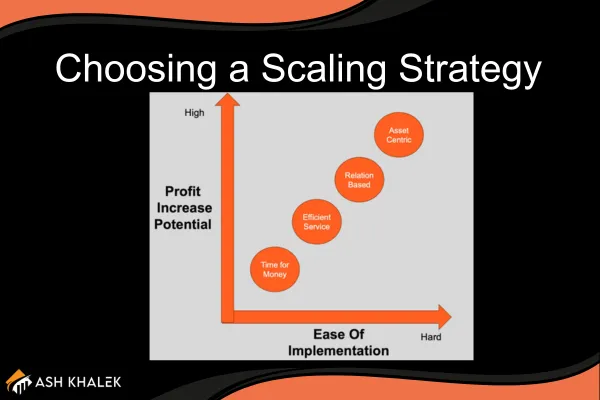BREAK THROUGH THE GROWTH CEILING
Practical tips, strategies, and insights to help service-based business owners scale sustainably without losing control or burning out.

Choosing the Right Service Business Scaling Strategy: Implementation Framework
Your scaling instincts are probably wrong.
Daniel, the founder of a successful 18-person architecture firm, sat surrounded by sticky notes and whiteboard sketches in his office late one evening. Over the past few weeks, he'd been exploring different scaling options for his business and now found himself overwhelmed by possibilities rather than clarity.
"We could package our residential design process into standardised service tiers," one note suggested. "Or develop a subscription model for ongoing modifications and consultations," read another. "What about creating a digital platform that connects homeowners with vetted architects?" a third proposed.
Each option seemed promising, yet Daniel couldn't shake a growing sense of uncertainty. Which approach aligned best with his firm's strengths? Which would his clients embrace? Perhaps most importantly, which path would lead to both growth and the quality of life he and his team sought?
"I know we need to evolve beyond our current model," Daniel confided to his business mentor, "but with so many possible paths, I'm paralysed by the fear of choosing the wrong one. What if we invest months of effort heading in a direction that doesn't work for us?"
Daniel's firm had reached a pivotal moment—one where the abundance of scaling options had become an obstacle rather than an advantage.
The Service Business Scaling Selection Challenge
Daniel's situation reveals a common challenge that successful service business owners face when exploring scaling strategies:
The External Problem: With multiple viable scaling pathways available, service business owners often struggle to identify which approach best fits their specific business model, client base, and market position. The risk of investing significant resources in the wrong scaling strategy creates real hesitation.
The Emotional Tension: Daniel feels both excited about scaling possibilities and anxious about making the wrong choice. This ambivalence leads to analysis paralysis—continuing to research options rather than taking decisive action in any direction.
The Fundamental Question: How do you choose the right scaling path when multiple options could work? Daniel believes in making strategic rather than random choices but lacks a framework for evaluating which approach offers the best fit for his specific business.
The abundance of scaling options that should represent opportunity has instead become a source of uncertainty that prevents forward movement.
A Fellow Traveler on the Journey
Having been part of the transformational journey for numerous service businesses through the process of selecting and implementing the right scaling model, I recognise the paralysis that Daniel is experiencing. That tension between knowing you need to evolve and fearing you'll choose the wrong path is one I've seen many business owners navigate.
The journey to selecting the right scaling model isn't about finding the single "perfect" approach—it's about making a strategic, informed choice based on your business's unique DNA, your personal aspirations, and a clear assessment of implementation readiness.
Running my own business, combined with 20 years of helping businesses scale, has taught me what works—and, more importantly, what doesn't. I've seen the costly mistakes and dead ends that can waste precious time and resources. This hard-won experience helps you bypass the trial and error that slows most businesses down, allowing you to unlock your business's full potential while staying true to your vision and values.
The Scaling Model Selection Framework for Service Businesses
Choosing the right scaling approach involves evaluating fit across four key dimensions:
1. Business Model Compatibility
Which scaling approaches align with your current business strengths?
What's the natural evolution of your existing services?
Which models build on your team's core capabilities rather than requiring entirely new skills?
2. Client Readiness Assessment
Which approaches would your current clients embrace most readily?
What scaling models address unmet needs you've identified in your market?
Which approaches allow you to maintain or enhance your client relationships?
3. Resource Reality Check
What financial, team, and time resources can you realistically allocate to implementation?
Which models can you begin implementing with your current resources?
What's the expected timeline to initial results for each approach?
4. Personal Alignment Evaluation
Which scaling models align with your personal goals and desired lifestyle?
What approaches would be energizing rather than draining to implement?
Which models create the type of business you actually want to lead?
Taking Decisive Action
The path from evaluation to implementation includes these practical steps:
Step 1: Prioritisation
Based on your framework evaluation, rank your scaling options from most to least aligned across all four dimensions. Identify the approach that offers the strongest overall fit.
Step 2: Minimum Viable Implementation
Design the simplest version of your selected scaling model that would create meaningful results. Focus on validating the concept before perfect execution.
Step 3: 90-Day Implementation Sprint
Create a focused 90-day plan to implement your minimum viable version. This timeframe balances urgency with realistic execution.
The Stakes of Decision
Continuing in a state of analysis paralysis means:
You'll remain stuck in your current growth-limiting model while competitors evolve
Your team will experience the frustration of discussing change without implementing it
The energy and momentum for transformation will gradually dissipate
Your business will miss the growth potential that inspired your exploration in the first place
Strategic model selection offers a different future—one where you move forward with confidence, focus your resources on the approach most likely to succeed for your specific business, and create momentum that energises rather than depletes you and your team.
Daniel's Selection Breakthrough
Daniel's journey to clarity began with systematically evaluating each scaling option against the four framework dimensions. He created a simple scoring system from 1-5 for each dimension and mapped his options:
Service Packages scored highest in business model compatibility and client readiness
Subscription Services showed strong potential but would require significant new systems
Digital Platform ranked highest for long-term potential but lowest for current resource reality
The evaluation revealed Service Packages as the clear starting point, with the highest combined score and fastest implementation timeline.
Daniel designed a three-tiered residential design package system:
Essential: Standardised design process for straightforward projects
Signature: Essential plus enhanced customisation options
Premier: Fully custom design with additional consultation services
The implementation transformed his business:
Proposal process time decreased by 60%
Conversion rate increased from 35% to 52%
Project profitability improved by 25% through standardised processes
The clarity of offerings actually attracted more ideal clients
Most importantly, the success of this first scaling initiative created confidence to explore additional models. Six months later, Daniel began developing a subscription service for ongoing modifications, building on the foundation established by his successful package implementation.
"The framework didn't just help us choose a starting point," Daniel reflected, "it gave us a scaling roadmap. Now we're methodically implementing multiple approaches in the right sequence, each building on the success of the last."
Your Selection Journey
Which service business scaling strategy offers the strongest alignment with your business's unique situation for strategic scaling implementation? The path to scaling clarity begins with systematically evaluating your options against the four key dimensions and identifying your optimal starting point.
Take the Scaling Readiness Check 16 Questions. 5-minute check. Immediate insights and receive a personalised assessment of which scaling model offers your best first step, along with a customised implementation roadmap.
[Take the Scaling Readiness Check Now → Discover your ideal scaling path and implementation plan]
Bringing It All Together
Throughout this series, we've explored eight distinct approaches to scaling your service business beyond the limitations of the time-for-money model:
Understanding the time-for-money ceiling and why 70% of service businesses grow but never truly scale
The three pathways beyond time-for-money: Enhanced Service Performance, Relationship-Driven Growth, and Asset-Leveraged Revenue
Service Packages that standardise your offerings for greater efficiency and profitability
Outcome-based pricing that aligns compensation with the value you create
Subscription Services that build predictable recurring revenue
Partner Network Models that expand your capabilities through strategic collaboration
Digital Platforms that extend your reach through technology
Knowledge Products that package your expertise for scale
The most successful scaling journeys don't typically involve implementing all of these approaches simultaneously. Rather, they begin with selecting the model that best aligns with your current business reality and implementing it with focus and commitment.
This initial success creates the foundation, confidence, and resources to explore additional complementary approaches—each building on the one before to create a truly scalable service business that grows revenue without proportional increases in time, stress, and resources.
Your scalable journey begins with a single, well-chosen step. What will yours be?
Readiness Check:
Could Your Service Business Double?
Take this quick check to find out if your business is primed for sustainable growth. Get a personalised report that highlights your strengths and reveals areas for improvement.
Copyright © 2025. Ash Khalek. All rights reserved.
Privacy Policy | Terms & Conditions
Built with clarity (and coffee) by Strategic Marketing Tribe

